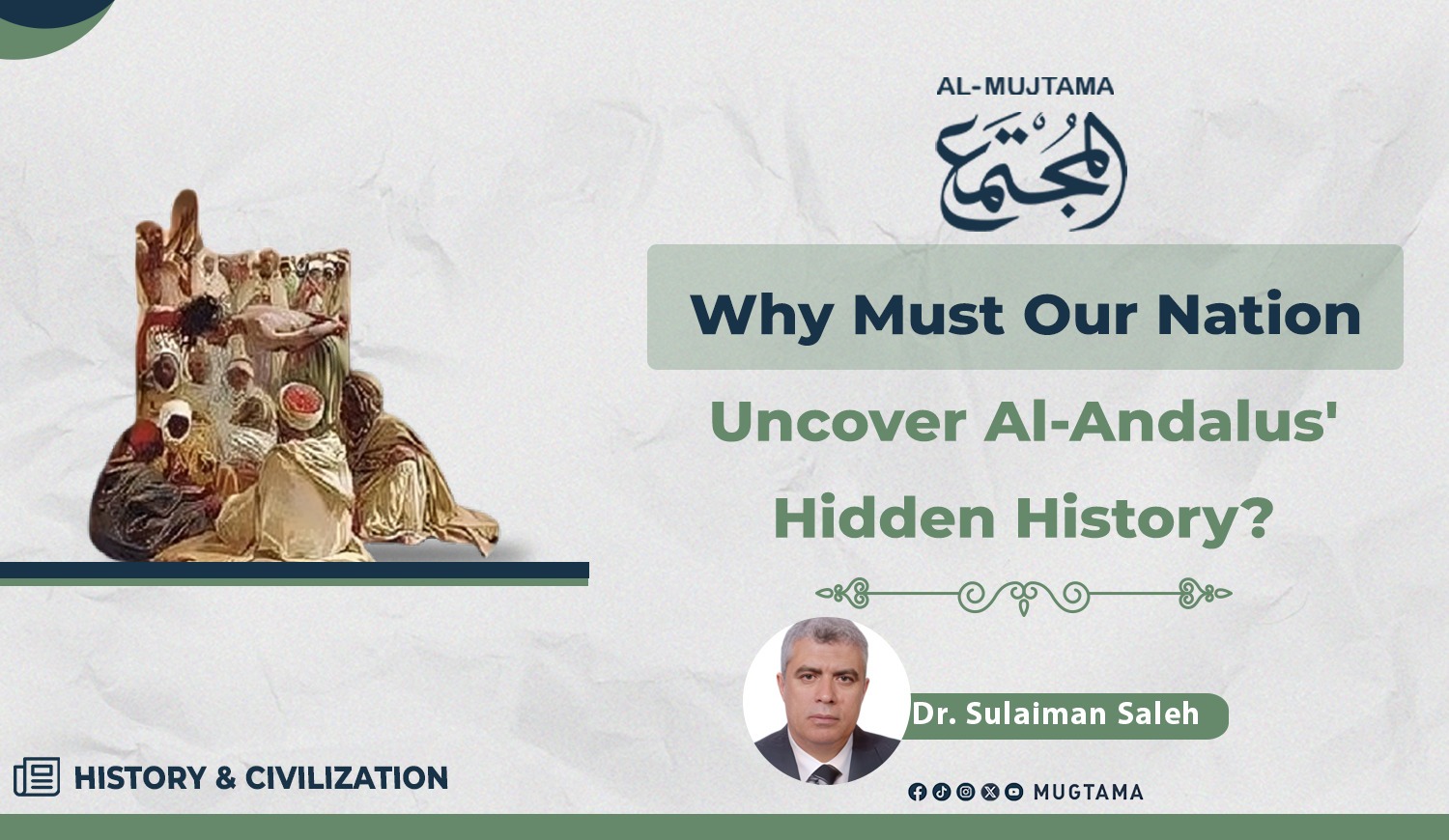The West distorts history…
Why Must Our Nation Uncover Al-Andalus' Hidden History?

Our
nation has the right to read its history to reclaim its memory and build its
future through knowledge. Western colonialism prevented the Islamic nation from
knowing many truths that could enhance its awareness, and among the most
important of these truths is what happened in Al-Andalus.
I
call for the preparation of a new generation of historians who seek the truths
hidden by colonialism, who strive to present their independent perspectives on
events, and who seek interpretations of them. The battle over history is tied
to the liberation of individuals, nations, minds, and hearts. Independence must
be based on an awareness of the nation's struggle to preserve its identity and
its civilizational role.
In
1992, I was teaching a course on the origin and development of mass media at
the Faculty of Mass Communication, Cairo University. Although my specialization
was in the history of journalism, I was committed to teaching from the textbook
authored by my professor, Khalil Sabat. During one of the lectures, I found
that the professor had inserted a phrase that I saw as unjustified within the
context of the course. It stated that the mother of Abu Abdullah Muhammad XII,
known as Boabdil or el chico(1)
—the last king of Granada—said to him as she saw him weeping while leaving the
capital of his kingdom: "Weep like a woman for a kingdom you did not
defend like a man!
I passed
the phrase and did not say it in the lecture, but when I returned home, I cried
with pain and anguish and regret, and I asked myself a question: Did Muslims
abandon Granada, did they not defend it and leave it to the Crusaders without
resistance?! Did they not defend Andalusia like men?! Who conveyed that
saying?! And why?! My mind, which has learned to critique and research, could
not accept that, and I decided to search for the truth. How could the great
civilization that Muslims built in Andalusia fall without them defending it
like men?!
Crime
against humanity
Here
are some truths that I discovered after a long struggle and arduous research,
which I am striving to transform into narratives, to write them with the heart
of a writer. I believe that literature is the most capable of depicting the
tragedies of history and tales of heroism, and that it can contribute to
restoring awareness, memory, and dreams to the nation.
One
of the most important facts is that the conflict between the Islamic nation and
the Crusaders is open, ongoing, and evolving, taking on different forms, with
both sides achieving victories and facing defeats. Military defeats can only
produce their impact when they transform into psychological defeats. Therefore,
the West has worked to turn the Muslims' tangible military defeat against its
armies into a psychological defeat that breaks hearts and causes minds to cease
searching for the reasons for revival and ascent. The West used propaganda to
promote a narrative that condemns Muslims and exonerates the Crusaders, placing
the blame on Muslims for being weak and unable to defend their civilization and
religion, while concealing the truths that contradict the validity of that
narrative.
Al-Andalus...
and the state of defeat.
I
have worked throughout my life to confront cultural invasion and to free the
nation from psychological defeat. I believe that history contributes to
building a comprehensive strategy to face psychological defeat, as it shows
that the nation can rise and provide surprises that those who focus on
interpreting reality cannot conceive; similar to what happened when Saladin
triumphed over the Crusaders, and as the nation was able to prevail over the
Mongols.
But
why Al-Andalus? The fall of Al-Andalus was a bitter and harsh defeat for the
Islamic nation, one that the West exploited to inflict a psychological blow on
the ummah. This led some writers and historians to focus on the moment of
collapse and downfall, placing the blame on the Muslims and claiming they did
not defend it like men. This created a state of psychological defeat, which
many sincere individuals suffered from, causing them to avoid confronting the
truth, seeking the causes, and raising awareness within the nation.
Because
Al-Andalus represented a model of the Islamic nation's civilizational progress,
showcasing their creative abilities in all scientific and literary fields, its
fall constituted a psychological and civilizational shock. This helps explain
many subsequent events, the most significant of which was Ferdinand and
Isabella's decision to burn all Muslim books. The fires raged for three days
and nights in the libraries of Al-Andalus, resulting in the destruction of
millions of books. This act represents a crime against civilization, humanity,
thought, science, literature, history, knowledge, and education.
However,
some of the Crusader intellectuals managed to conceal certain books in the
field of applied physical sciences, which contained explanations of the
experimental method, and they were able to transfer them to some European
countries. These books formed the foundation of the industrial revolution,
which was one of the main reasons for Europe's advancement and the modern
colonial wave in which Western countries dominated most Muslim lands and
subjugated the peoples.
This
industrial revolution could have been established by Muslims in Andalusia, as
they laid its scientific foundations and developed its methodology. However,
tyranny was one of the main factors that distracted Muslims with their
immediate disputes from envisioning the future, and it led some of their kings
to ally with the Crusaders.
From the
lessons of bitter defeat.
At a
time when all of Europe was gathering its strength and uniting its armies under
Isabella's leadership, Muslim kings were directing their armies to fight
against each other, with some allying with the Crusaders. The entire nation let
down the Muslims in Al-Andalus. Nevertheless, the Muslims achieved great
victories and bravely defended the cities of Al-Andalus. However, some believed
that retreating from certain cities to fortify themselves in others could stop
the Crusaders' advance. This marked the beginning of the defeat that started to
creep into hearts, fueled by the European propaganda that had evolved during
the Crusades.
The
souls of the Crusaders were filled with a desire for revenge for their defeats
against the Muslims in Palestine, and the great victory achieved by Saladin.
They took advantage of the moment of weakness among the Muslims in Andalusia
due to oppression; they directed all their armies with the aim of seizing
Andalusia and destroying the civilization that Muslims take pride in. This
represents a psychological defeat for the Muslims that is more severe and
harsher than a military defeat.
Read
also:
Seeking help from enemies... The merciless lessons of
history.
Why should
the story of Boabdil be studied?
To
understand the cause of the defeat, we must study the story of Boabdil with
awareness, so that we realize that tyranny cannot achieve victory, no matter
how powerful it is. His rise to power marked the beginning of the downfall. The
conflict had intensified within the ruling Nasrid family, as his father, Abu
al-Hasan, had treated the people of Granada with extreme cruelty and imposed
harsh taxes, which led to a deterioration in the situation. This pushed some of
the tribes of Granada to ally with Boabdil and declare him king instead of his
father in 1482. However, other tribes supported Abu al-Hasan against his son,
leading to a struggle for the throne between Boabdil, his father, and his
uncle, Al-Zaghall. This conflict tore the state apart and weakened its
resistance to the Crusader attacks.
After
Boabdil secured his rule, he tried to portray himself as a strong young king.
He launched a campaign against the Crusaders, which ended in his defeat in the
Battle of Los Colorados in 1483, where he was captured. He remained in
captivity for several years, after which he struck a deal with Isabella to
become the ruler of Granada under their authority. He then returned to fight
his uncle, Al-Zaghall, with the support of the Crusaders.
After
Boabdil secured his rule, he tried to portray himself as a strong young king.
He launched a campaign against the Crusaders, which ended in his defeat in the
Battle of Los Colorados in 1483, where he was captured. He remained in
captivity for several years, after which he struck a deal with Isabella to
become the ruler of Granada under their authority. He then returned to fight
his uncle, Al-Zaghall, with the support of the Crusaders.
After
the Crusaders realized the weakness of the Muslim forces as a result of this
struggle, they began to impose a siege on Granada that lasted for 9 months
during which supplies ran out, and people suffered from hunger and disease.
Abdullah the Little was secretly negotiating with the Crusaders to surrender
and hand over the city.
They are
breaking the agreements
Boabdil's
position was weak in defending the city, which raises doubts about his
character and his relationship with the Crusaders. Nevertheless, he signed a
treaty with them in January 1492, which involved surrendering the city of
Granada to Isabella in exchange for guaranteeing the safety of its inhabitants,
protecting their lives and property, allowing Muslims to maintain their
religion and rituals, and not forcing them to convert to Christianity. The
treaty also ensured that Muslims could keep their properties, especially the
mosques, and that those who wished to leave could do so, taking their wealth
with them.
Under
the terms of this agreement, Boabdil opened the gates of the city, and Isabella
entered the Alhambra Palace, marking the end of Islamic rule in Al-Andalus.
But
did the Crusaders abide by the treaty? And what did they do in Granada after
seizing it? We will continue the story in the next episode.
Read
also: Basharat Revolution & Muslim Sacrifices in
Andalusia
___________________________
1. Abu
Abdallah Muhammad XII : The Spaniards called him el Chico (meaning "the
Little") and Boabdil (a Hispanicized form of "Abu
Abdullah"), while the people of Granada referred to him as Al-Zughabi—meaning
"the unfortunate" or "the wretched one. was the 22nd and
last Nasrid ruler of the Emirate of Granada in Iberia.











